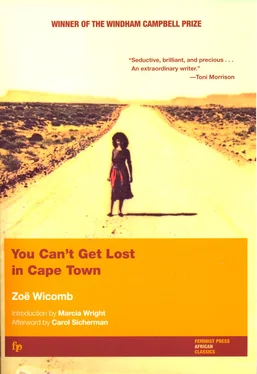On that long walk home with the month’s mealiemeal swaying on her head she squirmed at her extravagance. Skitterboud would be angry. She tried to be a good wife but there were so many people a woman had to please that she no longer knew what to do. As for the children — and she smiled as she thought of the enamel plates — they had seen neither train nor rose.
Ounooi Annie had a rose bush, right there in the middle of the veld, so that when she arrived at the big white house she had not minded so much after all. That was what a woman had to do. Baas Karel said shortly after she had come to stay that the place for his shepherd’s new woman was in Ounooi Annie’s kitchen. She knew that that was right, but oh, how she had hoped that Skitterboud’s smile and sweet talk would keep her out of that farmhouse so far away from their own pondok.
But as she approached, there was the rose blazing red in the sun so that she smiled as she pored over it, its breath on her cheek until she looked up to see Ounooi Annie smiling at her and yes, she thought, it would not be so bad after all, not so bad surrounded by these pretty things. For the curtains flapping in the window sent their printed pink posies spilling out on to the veld. Ounooi smiled, ‘Pretty roses hey! You can look after them if you like.’ And she, Magriet, plunged both hands into the rosebush to cup for a second the scented redness so that the Ounooi shrieked, ‘Meid, Meid, pasop!’ and she watched red blood trickle through her fingers thinking, That is my new name, baptised in blood.
Once her mother had told her of the name Magriet, a flower in the garden of Ounooi Visser whom she worked for until her death. White with a yellow-sun centre. How fervently she had whispered those words to the wind. Seeds, she had been taught at mission school, could travel for miles in the wind and she waited for the stray marguerite to root in the veld. But the wind whistled by in a flurry of dust; the name did not sound real. It was bound to be reclaimed some day. And so she became Meid.
Ounooi was sorry but she had plenty grounds for complaint. Cleanliness was next to godliness and Meid did not clean with the thoroughness expected in a Boer house. She was too often caught dreaming and she neglected even to water the rose. This was true. On the gleaming sideboard in the parlour she lavished all her care on a brass bowl of artificial carnations. She wrapped the cloth tightly around her little finger and, wetting it with spittle, carefully crept into the crevices of the waxy pink petals with their impossibly frilled edges. They made her smile. Whatever will these Boers have next? She could stare for hours into the glass front of the sideboard but best of all were the carnations. She wondered what would happen if she watered them.
Ounooi said to Skitterboud as he waited in the kitchen for his wages and the weekly bottle of wine, ‘She’s lazy, you’ll have to take her away and train her and then perhaps we could try her again some time.’ Lowering her voice she added, ‘She’ll be better, more willing to learn, if you married her. It’s not right, you know, even if you Bushmen will not think of God, He doesn’t forget you. He looks upon your sins and weeps.’
Meid could swear that Skitterboud wiped away a tear as Ounooi gave details of the document that would console God. She watched him crumple his hat in both hands and dimly did she hear the sound of his tin guitar twang out of tune. She could not remember the excuse she made for going back to the parlour where under their very noses she plucked a plastic carnation from its brass bowl. A ridiculously long stem but she would weave it through her doekie, for a marriage surely meant dressing up as for a dance.
Was it the marriage that brought all the children? God’s blessing? Her girl was to be named after a flower, but a flower she would know, something she could shout to the wind: the Namaqua daisy that breaks out of the stones washed white by winter rain, so that the hills hum with colour in the sun. Just Blom, plain flower, a name that no one could take away from her. She would never take her to the big white house.
She went back from time to time when Ounooi needed her. But as soon as the children filled out with food she lapsed and shamefully disappointed Ounooi whose self-respect could not allow Meid to stay. Not that Meid did not keep her eyes lowered or keep her voice from rising into a question mark, but the tell-tale dust pressed against a white finger trailed along the sideboard; her quiet yes to all Ounooi’s questions curdled in the blandness of the mutton bredie she served up — always a few minutes late.
Back home there were the children, hers again, and the patch of mealies she kept alive with buckets of brack water they carried from the river. The cobs were stunted, but in autumn she listened to the tall stalks rustling like paper in the wind. Then the marriage brought another child and she found herself once again standing at Ounooi’s back door, her head bowed.
Skitterboud’s figure was a black dot in the distance but little Blom still waved. Meid had gathered clothes in bundles and was now ruining a see-through doekie by weaving through the delicate stuff the thick stem of a faded plastic flower. She had not been allowed to wear it on the day of her marriage. Skitterboud said that it was wrong, that the magistrate would know by just looking that it was stolen. She snorted at the memory. The red-nosed man did not even look at them. His pale eyes were fixed at some point above their heads, taking instruction from God. Oh, she had not expected him to smile at them, but how could the sin be put right by Him if he, the intermediary, did not know what they looked like? She knew right from the start that the certificate had no power over her; that it was a useless piece of paper and certainly no match for the tokolos. She knew the tokolos would win in the end. She was the first to see him. On a summer’s night when they escaped from the heat of the house and the restless children to lie under a white moon, the stunted figure scuttled by, stared boldly and disappeared into thin air as she screamed. Skitterboud, who fortunately had a full bladder, pissed a wide circle around the house to protect them for the night. It was the very next day that Giel arrived.
The children shrieked with delight and she had to bend down for them to touch the frilled edges of the carnation now faded with age.
‘It’s horrible like you, like you, like you,’ chanted Dapperman at Blom.
‘No it’s not, it’s beautiful,’ said Blom, whose voice quivered uncertainly at the dirty pink of years of dust.
And they were off again, wringing each other dry with taunts. She would leave them to fight it out, wait until Blom, ashen with spent rage, should collapse on her for comfort. Meid waited, propped in the shade against the house. Around her the strange damp circles of just-darkened earth crimped at the edges. The tears of the earth, she thought, the stifled tears that rise mistily by night leaving the grey stain of salt. She watched the shafts of heat sucking up the moisture as the shadow of the house was shoved along by the sun. She burrowed a hand into the delicious cool sand. It crumbled through her fingers and fell into an untidy heap. She should not have disturbed this shadow of moisture. But things will happen without your consent just as Giel arrived and things could no longer be the same.
She had heard of him, the smart nephew who worked at a garage in the town. He arrived with wonderful tales which he told after much clearing of the throat as everyone gathered around Oompie Piet’s fire in the evenings. Of how he had driven cars, of trains with green leather seats and of three months spent in gaol for a crime which he could not tell about or had not yet ascertained. But when he described the red shirts and khaki shorts of the convicts lined up with their sickles to harvest wheat for Baas van Graan, his eyes blazed with anger. He tugged at the spotted neckerchief and looked into the distance and his eyes scaled the hills and seemed to land in the town from where his words came oven fresh.
Читать дальше












